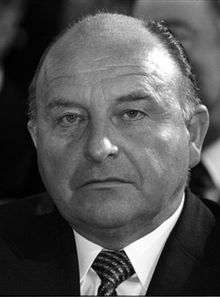Siegfried Buback

Siegfried Buback (January 3, 1920, Wilsdruff, Saxony – April 7, 1977, Karlsruhe) was the Attorney General of Germany from 1974 until his death.
Life and career
Buback studied at the University of Leipzig. From 1940 to 1945, he was a member of the Nazi Party, while serving as a soldier in World War II. From 1945 to 1947, he was a prisoner of war. In 1953 he became an attorney, and continued his career until 1972 as general attorney.
His name first appeared in public in 1962 when he accused the political magazine Der Spiegel of high treason in the Spiegel scandal. In 1966, the case lead to a groundbreaking ruling of the Federal Constitutional Court of Germany about the freedom of the press.
In the 1970s he was decidedly opposed to the Red Army Faction (RAF) and became the first assassination victim, along with his driver Wolfgang Göbel and judicial officer Georg Wurster, in a series of events called the "German Autumn".
Assassination
Buback was shot by members of the RAF while travelling from his home in Neureut to the Bundesgerichtshof in Karlsruhe; while Buback's Mercedes was stopped at a traffic light a motorcycle pulled alongside and the passenger on the rear of the motorcycle opened fire with a semi-automatic HK43 rifle at the vehicle. Even though four RAF members (Christian Klar, Knut Folkerts, Günter Sonnenberg and Brigitte Mohnhaupt) were formally charged and prosecuted in connection with the Buback murder, important details of their involvement have not been solved. German authorities have so far been unable to find out who was driving the motorcycle and who was firing the weapon at Buback.

In April 2007, 30 years after his assassination, Buback's violent death became again the subject of public discussion when his son, Michael Buback, was contacted by former RAF member Peter-Jürgen Boock. Boock shared details with Buback's son indicating that it was Stefan Wisniewski who had fired the gun at Siegfried Buback.[1][2][3] Verena Becker, another former RAF member, has also claimed Wisniewski was the killer.[4]
On July 6, 2012, Becker was convicted of assisting the (still unknown) murderers and sentenced to four years in jail.[5]
References
- ↑ "Baader-Meinhof gang member released". Times Online. 2007-02-12. Retrieved 2007-02-12.
- ↑ "Wisniewski soll Buback-Mörder sein". Spiegel Online. 2007-04-21. Retrieved 2007-04-22.
- ↑ Who Assassinated Siegfried Buback? Germany Revisits RAF Terrorism Verdict - International - SPIEGEL ONLINE - News
- ↑ http://www.spiegel.de/international/germany/0,1518,478928,00.html
- ↑ http://www.ksta.de/politik/raf-prozess-becker-wegen-beihilfe-verurteilt,15187246,16561874.html